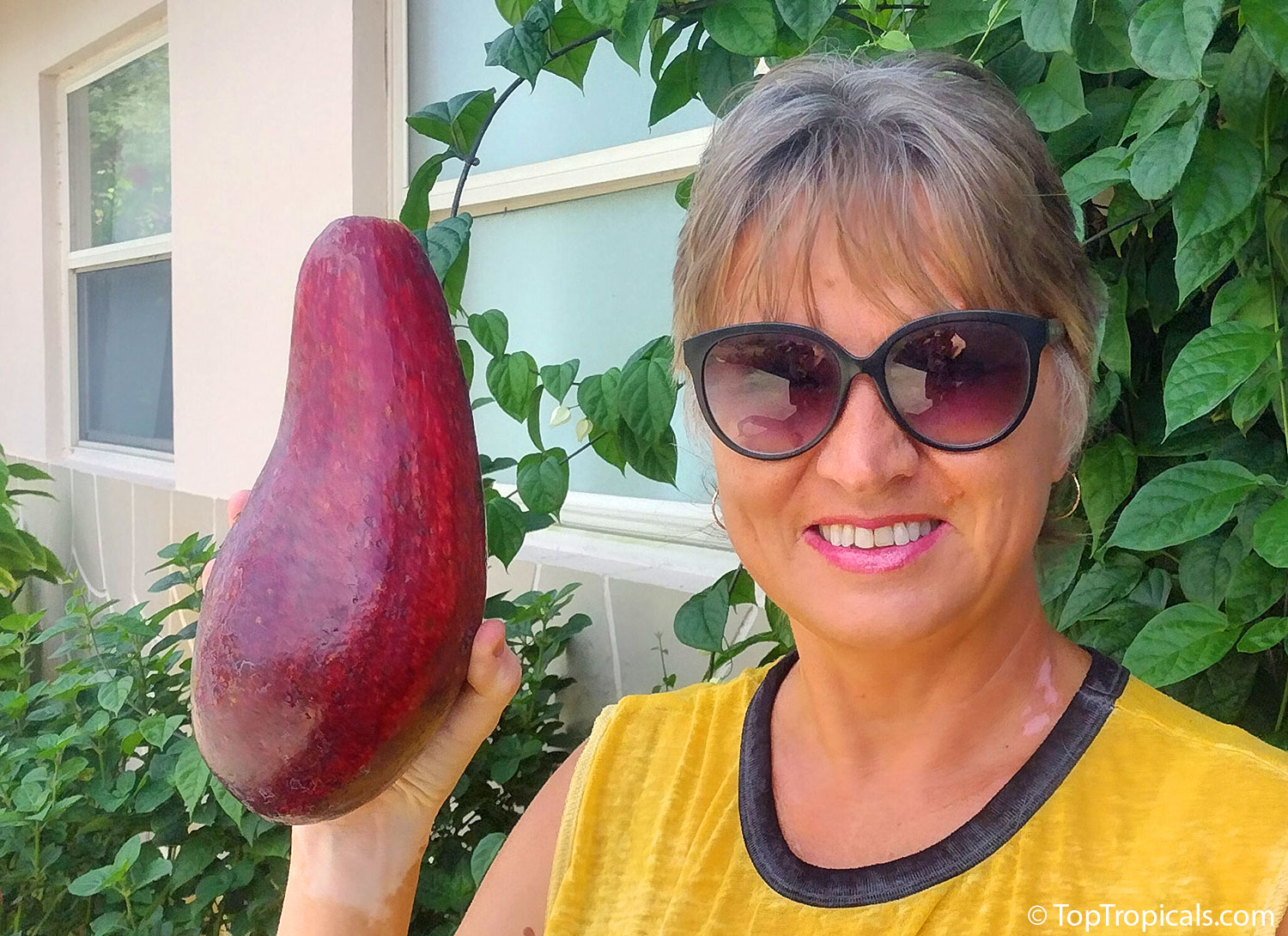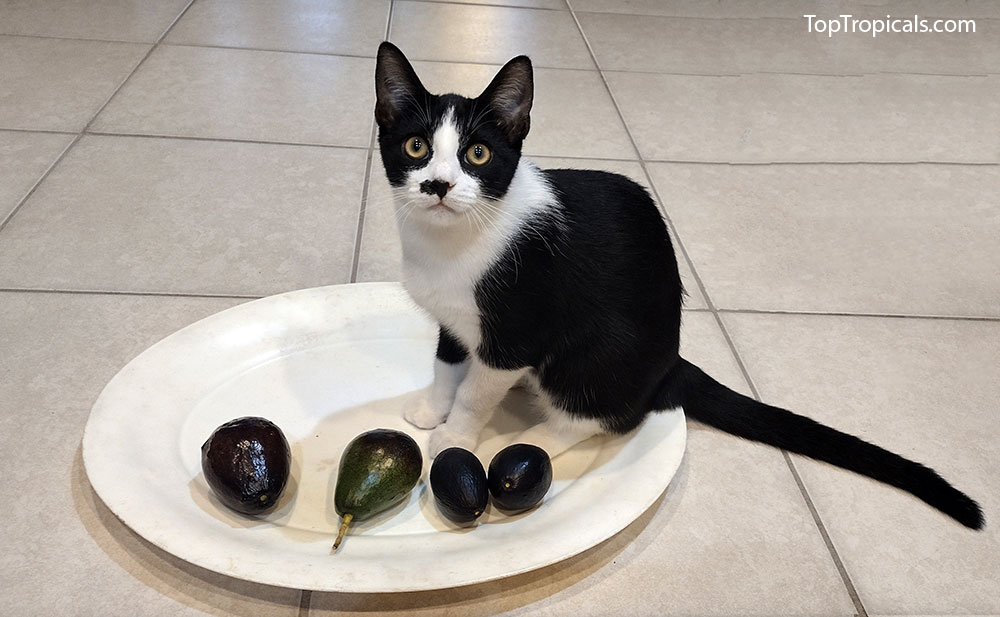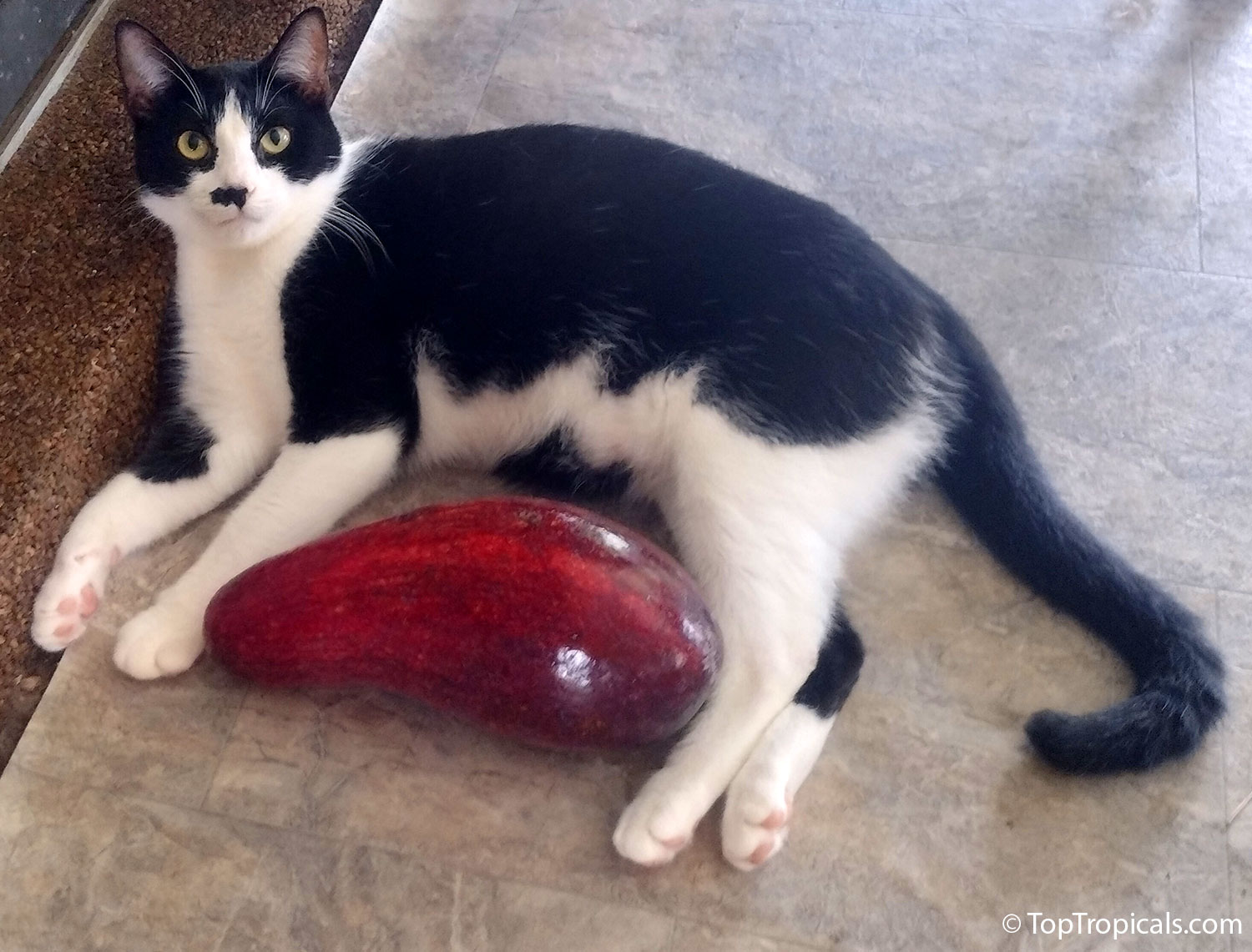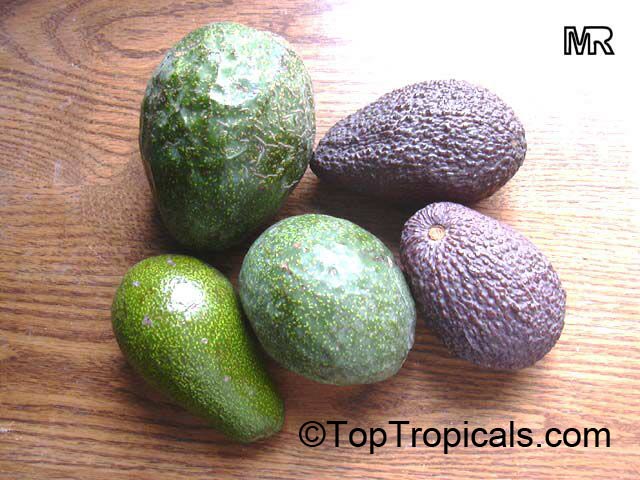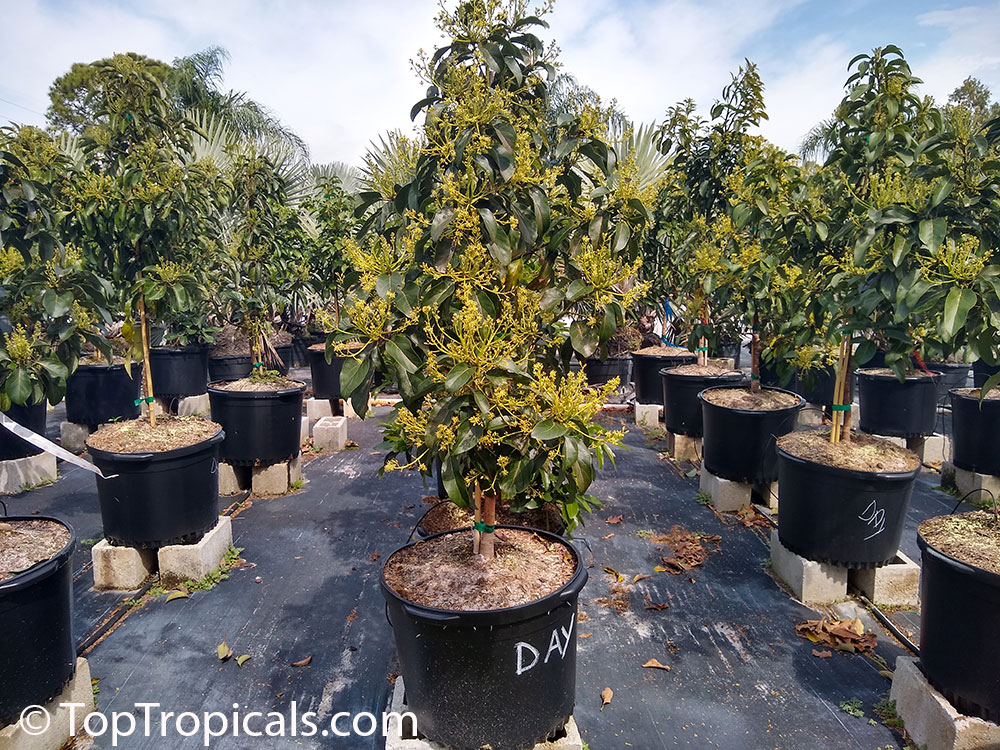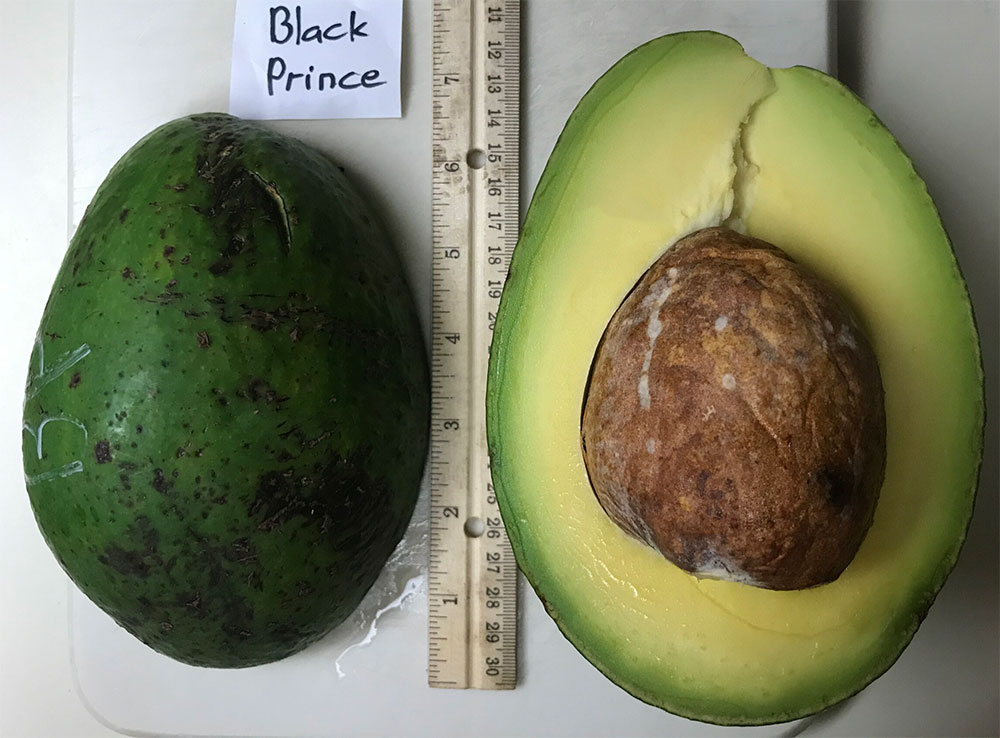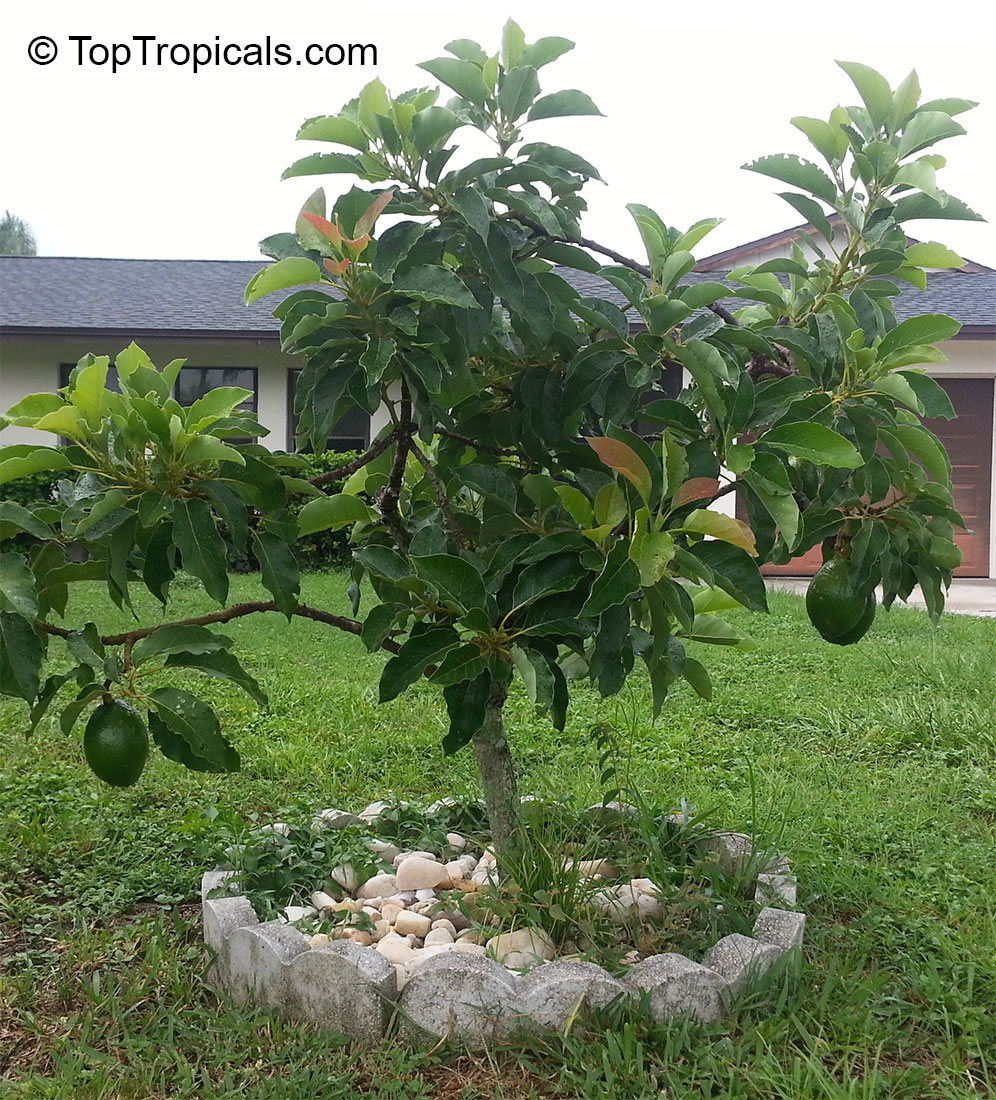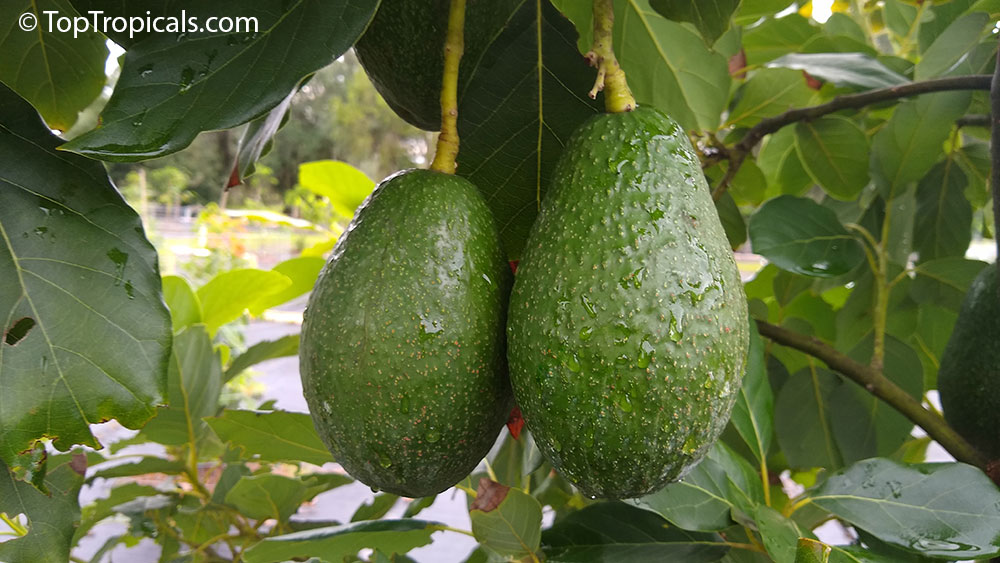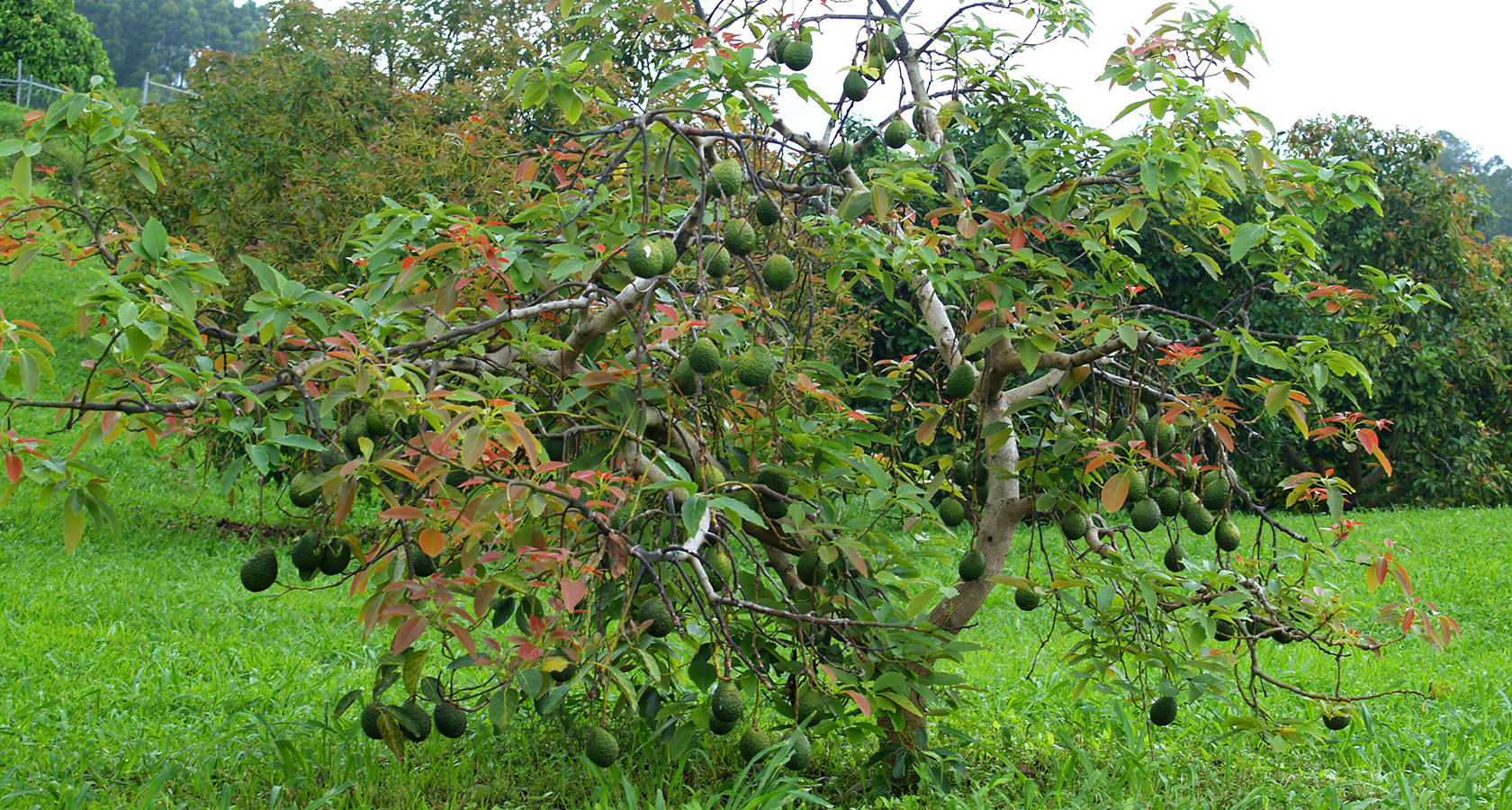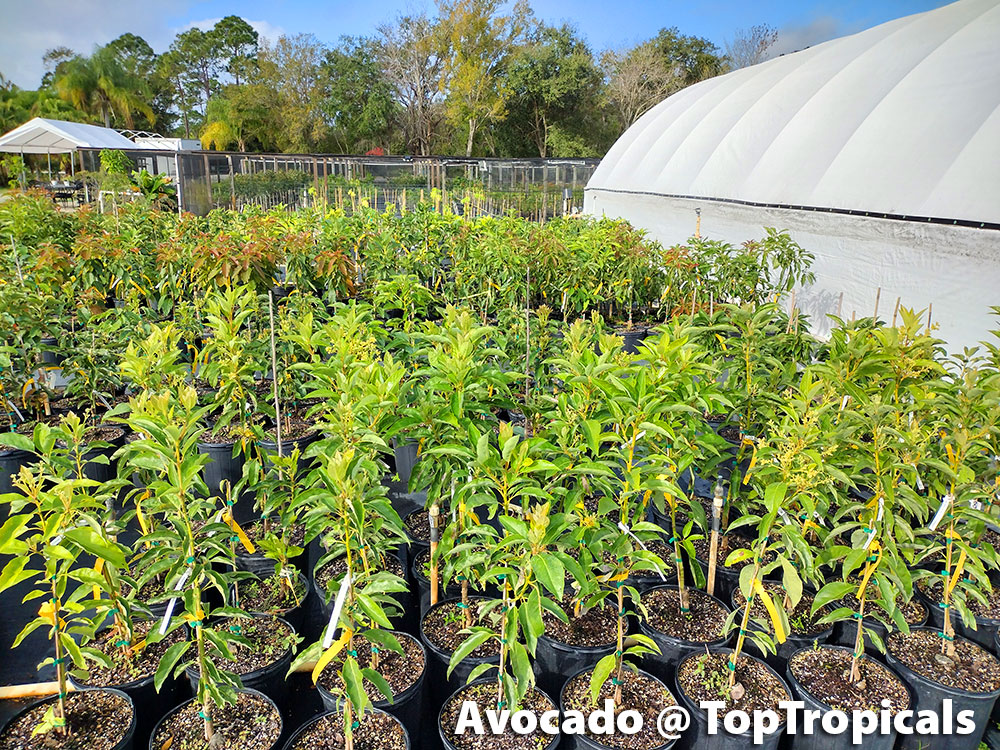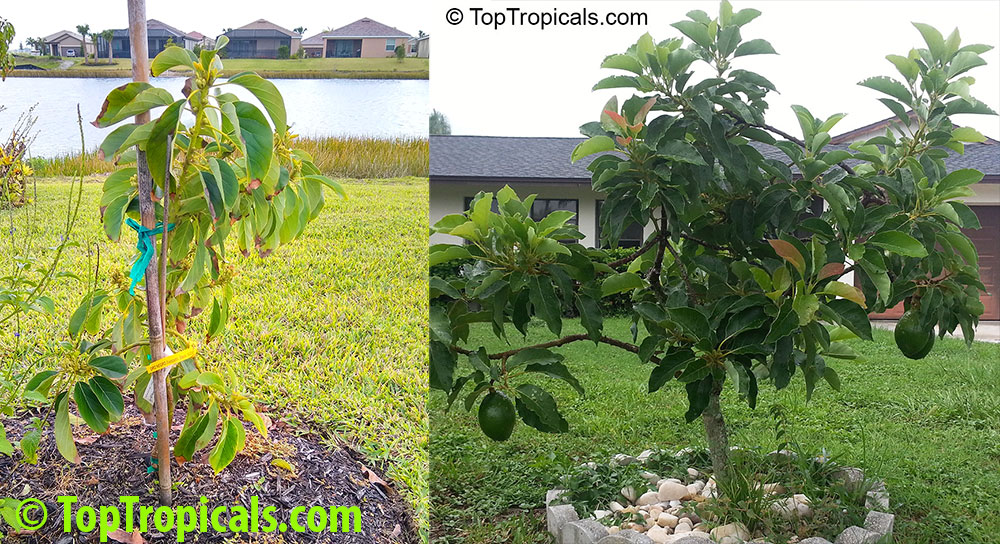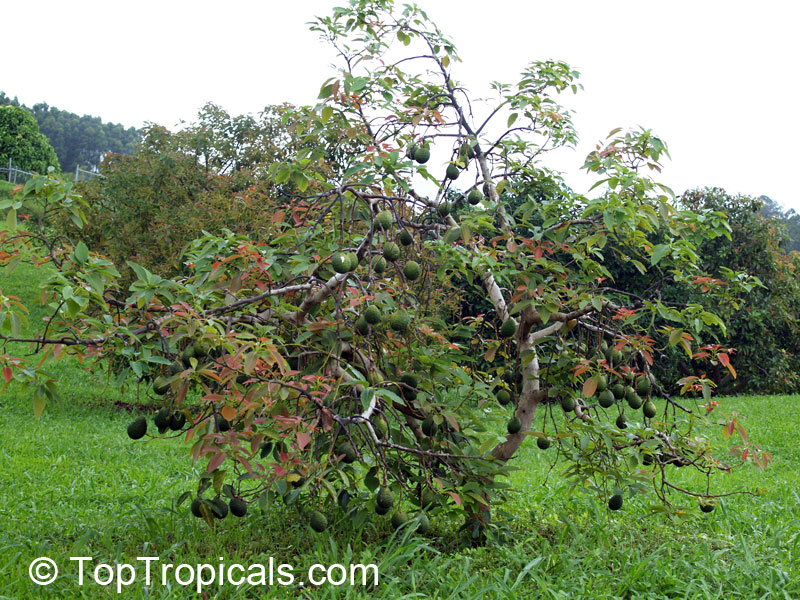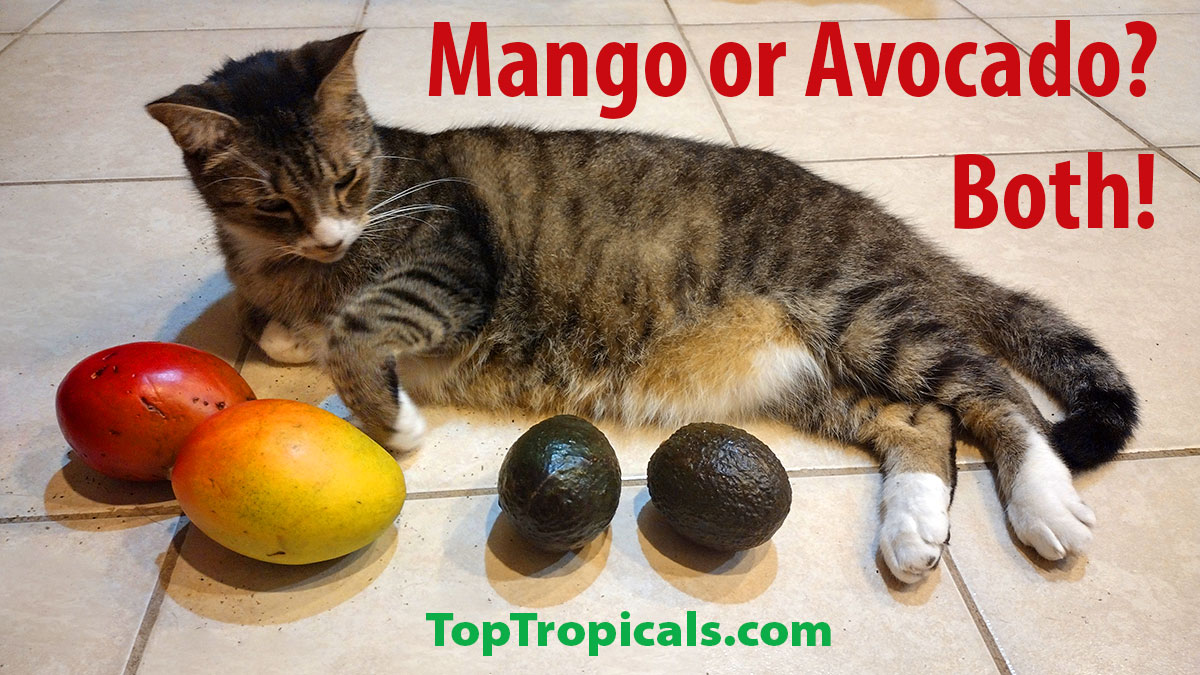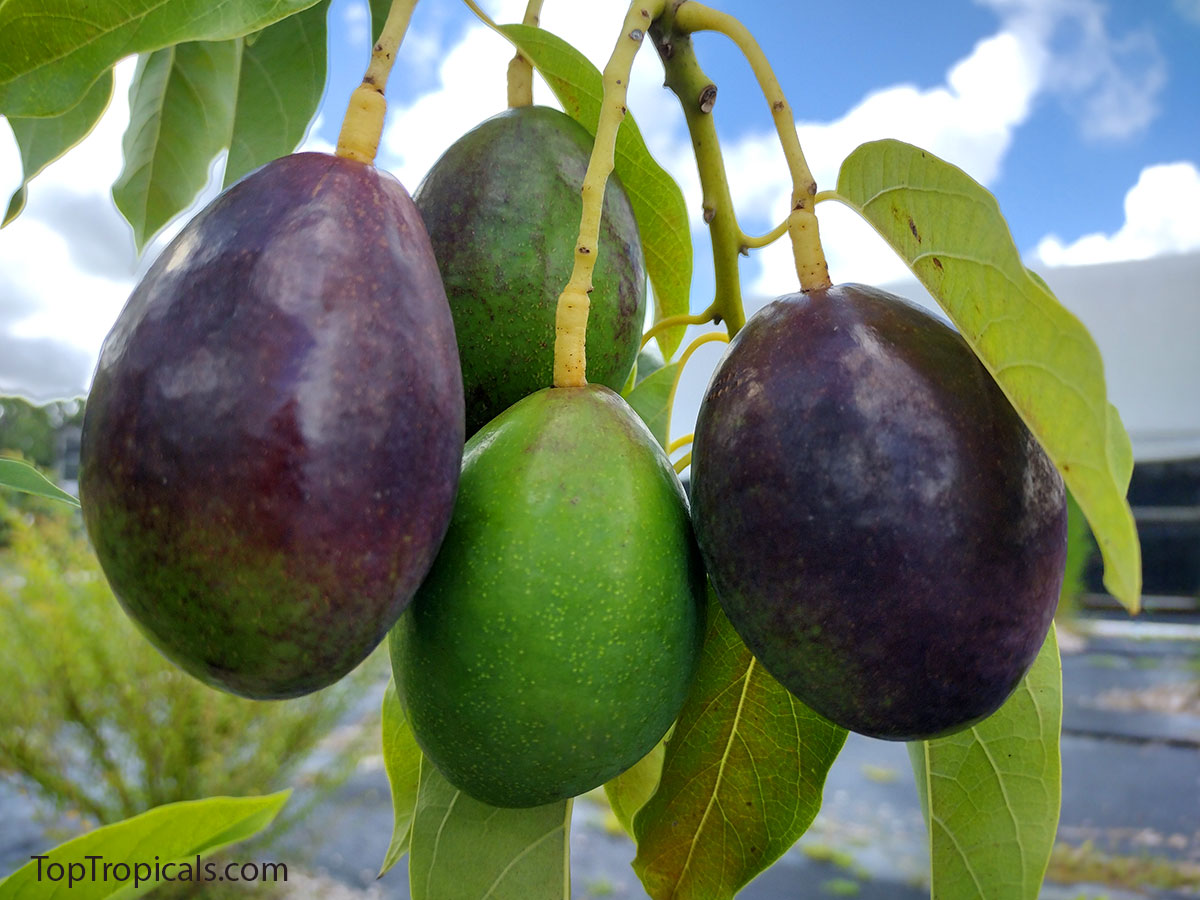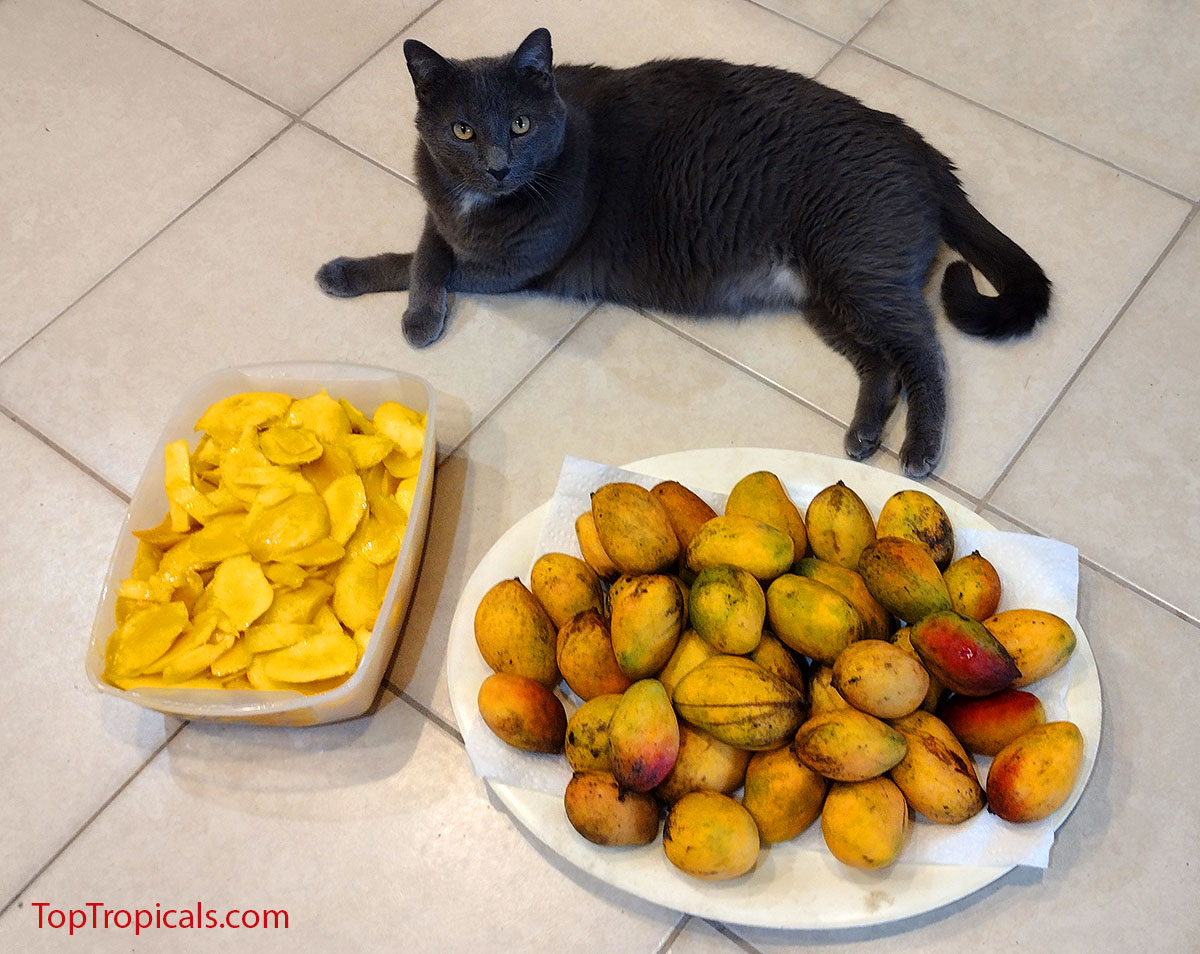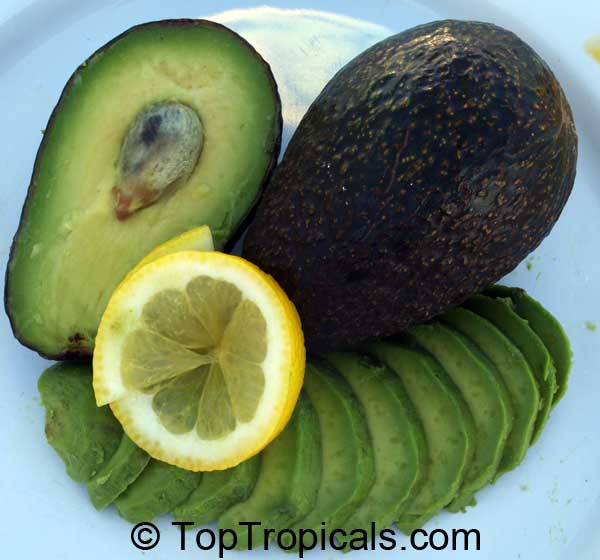Garden Blog - Top Tropicals
Date:
Avocado Variety Guide: Snack or Guacamole?
Collector's inspiration
Photo above: It's NOT an egg plant! It's a Red Russell :)
A comprehensive guide to Avocado varieties by: flower type A or B, tree habit, fruit shape and quality, cold hardiness, origin, season and more!
Many gardeners who are eager to purchase their first avocado tree often wonder which variety to choose. Most people are familiar with two primary classifications commonly found in grocery stores: Small & Black or Large & Green.
Frequently, we hear customers ask, "Do you have the one I like, the smaller fruit with bumpy skin? Not that big, tasteless, and watery one!" What they may not realize is that this basic (but practical!) classification doesn't encompass all the wonderful qualities avocados have to offer. There are numerous hybrids in cultivation, and once you plant your first tree and taste the REAL fruit (not from the grocery store), you'll be eager to explore other varieties. It's a guarantee! While it's true that avocado fruit can vary in "butter" content and how "watery" or "buttery" it is, most superior varieties are equally delicious. Or perhaps we should say they are so versatile and distinct in taste that you'll start building your collection of these trees, much like fruit enthusiasts do with mango varieties.
Every garden has unique requirements based on climate, temperature, and property size. These factors must be considered before planning your avocado garden. Additionally, many gardeners may wonder about Type A vs. Type B classifications and whether they need more than one tree to yield fruit. You'll find all this valuable information in our Avocado Variety Guide.
Basic classifications of avocados
1) By flowering pattern and pollination behavior: Type A and Type B
2) By origin: Mexican, Guatemalan, and West Indian (along with many hybrids)
3) By fruit appearance, texture and taste: Guacamole Avocado ("Smooth skin") and Snack Avocado ("California" or "Hass" type)
4) By growth habit: full size trees, free branching or upright, semi-dwarf low growing, and dwarf ("condo avocados")
5) By cold hardiness: Cold sensitive (requiring frost-free conditions), cold tolerant (able to withstand light frost), and cold hardy (capable of enduring some hard freezes once established)
6) By ripening season: Early or Spring (March-June), Mid or Summer (July-September), and Late or Fall-Winter (October-February).
Date:
What is the best Avocado variety?
Grow Your Own Food
Q: Most trees in my yard were destroyed by hurricane Ian and now I have to start my landscape from scratch. So I decided to plant something useful. Avocado is my favorite. In the stores I see two kinds, large green or small black, but I was told there are many varieties. When I googled the best variety of avocado I found your website. You have quite a selection! Now I don't know which variety to chose. Can you please help? I have room for several trees.
A: Indeed there are many varieties of Avocado (we grow over 50 kinds). Some avocado lovers try
to get as many varieties as they can fit in their yards because every variety
has its unique flavor and texture.
2 main Avocado kinds that we usually see in grocery stores are -
1) smaller black fruit with rich, buttery texture - Mexican and Guatemalan
hybrids
2) green avocado, some can be as large as a small melon, but they have
light texture - West Indian types
There are many hybrids. How to pick the right variety for your yard?
Check out our Avocado variety page and scroll down to see a chart that shows characteristics of fruit, tree size, cold hardiness, and chose the right variety that fits your needs.
Below are just a few picks from our horticulturist - our favorite varieties that we enjoy and highly recommend to others.
Best tasting large green Avocado hybrids:
Bernecker, Beta, Doni, Catalina, Pollock.
Best tasting black or dark green, buttery Avocado hybrids:
Winter Mexican, Brogdon, Black Prince, Day, Fantastic, Florida Hass, Marcus Pumpkin, Mexicola Grande, Nishikawa, Waldin
Dwarf trees (black fruit):
For local customers: see large 15-gal size Avocado trees, delivery and installation available!
Today all avocados are 13% off instantly with no min. order, take advantage of this quick sale and get all varieties you want!
Date:
The Magic of the Avocado
The Magic of the Avocado... Is it a super-food? A super fruit? The
perfect side dish for any meal? Or does the avocado just taste great? If you need
a proof of the Avocado's status as a super-food, here are some of the benefits.
READ MORE >>
At TopTropicals, healthy and tasty avocados are available in a number of varieties, over 30 choices right now! We also have prices as low as $59 and you can always use our newsletter coupons to save even more. Try all the varieties and start or expand your Avocado Super Garden today!
Cat Philimon (a.k.a. Philly Cheesesteak) eating Avocado
Avocado makes everyone happy! It is Cat Philimon's favorite food. We always have to share with him. Otherwise he just helps himself. He knows it's good for you!
Date:
Avocado Black Prince
Grow Your Own Food
Avocado variety - what's the taste?
We obtained Black
Prince Avocado variety this year and at first didn't know much about it.
Until we tried the first fruit! The fruit was large, oval, green and
slightly pebbly. We were not sure if it would taste like some green avocados -
watery and less buttery? The fruit turned black couple days after it was picked,
ripened and softened. We were pleasantly surprised, Black Prince deserves its
title! The fruit pulp is thick, and has a rich, nutty flavor. The little
trees grew this year vigorously and didn't show any bug or deficiency problems.
Superior variety for a backyard grower! Giving it 5 stars! *****
We have Black Prince
Avocado in 3 gal pots, as well as in XX-Large size for local pick up - for those who want a large fruiting
size tree, please contact our Garden Center to pre-order from our Growing Farm (B-Farm).
It can be delivered and installed for you!
Why grow your own Avocado tree?
Why grow your own Avocado tree? This is why. Now we import 89% of the U.S. avocado from Mexico. How much of a difference we could make if we were all growing our own avocados? Support our own horticulture, help Avocado to become grown in the USA!
Date:
Grow your own food:
Avocado Q & A
from Ed Jones, the Avocado Guy
Q: Do I need to have more than one avocado tree in order to produce fruit?
A: While a single avocado tree will normally produce enough fruit for most people, it never hurts to have more than one tree and even more than one variety to increase the chances for good pollination. Be sure to look at our catalog for the many different varieties available from our store.
Date:
NEW VIDEO:
ABC7 Fort Myers News:
Avocado Varieties at Top Tropicals
We continue the series of ABC-7 News on Top Tropicals selections. Previously, we showed you segments about Butterfly Plants, Rare Fruit Trees, and Mango varieties. Today's video is about growing an Avocado tree in your home garden.
Growing your own avocado tree has many benefits. You can enjoy fresh, delicious avocados right from your garden. Avocado trees are attractive, provide shade, and enhance your landscape. There are many avocado varieties to choose from, offering unique flavors, sizes, and ripening times. You will find Avocado trees for sale online right here at TopTropicals.com. Our trees can be shipped to you!
Watch the news segment by Rachel Anderson for ABC-7:
.
Subscribe to our Channel:
Stay updated with TopTropicals Videos by subscribing to our channel at YouTube.com/TopTropicals and get our latest video news of what is fruiting and blooming!
Date:
7 secrets of a Happy Avocado Tree
Q: I purchased an avocado tree from local garden centers three times but every time it dies on me. My neighbor has a nice tree in his yard and it grows beautifuly. I just purchased one online from you and I need to know what I was doing wrong? Are there any secrets how to make an Avocado tree happy? I have a big garden and several mango trees, but no luck with Avocado...
A: Avocado tree is famous for being such a pain to establish. But once it starts growing, it's growing! We will share a few simple tricks how to make it right.
1. Plant high and provide good drainage. Wet feet is number one
reason for failing an avocado tree. It doesn't like wet soil and won't
tolerate soggy conditions. Plant it in the highest spot of your yard and slightly on
a "hill" (3-4" higher than the surrounding ground).
DO NOT plant Avocado tree in low spots or wet spots of your yard. Save
those spots for Cannas or Black Sapote or even a Mango if you want a fruit tree there.
2. Use quality soil. Use only well-drained soil with high content of
organic matter. You may add compost to existing sandy soil, or add some professional potting mix that contains pine bark and perlite. Remove
rocks from the hole if you see any while digging. Dig a big hole and fill it
with a good soil; compact the soil in the hole very well before setting the
root ball. Reminder: plant the tree high!
3. Water regularly. After planting an Avocado tree in a nice high
spot with a good drainage, start watering it... daily! Avocado likes water,
although it doesn't like wet feet! Once you figure out this combination, you've
got the recipe of success. Water by hand daily for the first week after
planting, then twice a week for couple weeks, then once you notice new growth -
you may rely on sprinklers, but keep watching the tree and don't let the soil
over-dry. It must be slightly moist, but not soggy.
4. Fertilize. For such finicky tree, we suggest mild formulas of
fertilizers. Dry fertilizers may burn roots, especially of a young tree. Even
smart-release granulated fertilizers should be used very carefully. The best
way to feed your young avocado tree - get a complete set of Sunshine Boosters Pro system. It has all necessary elements for all
stages of plant development and never burns the roots. Sunshine Boosters Pro can
be used with every watering - no need to guess how much and when. Besides,
it is a natural fertilizer based on amino acids - exactly what you want to use
on your fruit trees and other edibles!
5. Boost immune system of the tree. Apply Sunshine Epi plant hormone every 2 weeks as a foliar spray to boost
immune system and metabolism of the tree and protect it from diseases. Epi makes
plants (especially young plants) grow twice faster! It also enhances effect
of fertilizers by increasing plant metabolism.
6. Do not prune until you see significant growth. The tree is small
and can use as many leaves and branches as possible for photosynthesis and
healthy metabolism. We suggest to avoid pruning for at least the first year. On
the second year your tree most likely will be covered with flowers (assuming
you followed fertilizer program). Let it go through the blooming stage and
setting fruit; prune in Fall after fruiting is over.
7. Keep number of fruit to minimum for the first crop. Don't let the
small tree exhaust itself. Keep just 2-3 fruit to develop. The next year, no
need to control fruit quantity, the tree will develop as many as it can
support.
P.S. If you got the tree from a mail-order, remember to establish it
in a pot before planting in the ground; move gradually from shade to sun.
Follow planting instructions.
Learn more about Sunshine Nutrition System - a Natural solution for your garden.
Date:
Veterans Day: November 11
Special Deals
Our special Veterans Day sale on tropical plants is a salute to those who served! Enjoy this discount code - a small token of gratitude for our heroes:
VETERANS23
Your savings with this code:
5% off orders $100+
10% off orders $150+
15% off orders $200+
Excluding S/H. Exp. 11-12-23
Mango & Avocado Super Sale!
Instant 20% off Mango and Avocado trees
Celebrate Veterans Day with the taste of the tropics! Indulge in our exclusive offer on Mango and Avocado trees, available now at unbeatable prices. With the discount code above, your qualified purchase of these trees can be as low as:
$64 for Mango trees
$61 for Avocado trees
Hurry up! Limited time quantities - while supply lasts!
Date:
Three interesting varieties of Avocado
Q: I intend to gift three avocados, at least one type A and one type B, to a friend who lives in an area where the temperature never goes below 25F. The idea is to give them a ripening season as long as possible. Which combinations do you suggest, and which are the A and B?
A: When talking about "A" type and "B" type in Avocados, we are referring to the flowers. An avocado will produce both male and female flowers on the same plant. "A" type means that the flowers are female in the morning and male at afternoon. "B" type means that the flowers are male in the morning and female in the afternoon. If you plant to start a commercial growth, then it's important to create a proper mix of both types. However, in hot and humid climate a single tree produces flowers of both types, so it is NOT necessary to have both A- and B- types planted together in the backyard. Even a single tree produces enough fruit for a home gardener.
It is also important to know that while there are "more cold hardy" avocados (hardy to as low as 15F), it refers to a full grown established tree. Young trees still need protection from the cold until they are bigger and more established. One can not expect a small tree planted in June to survive the first winter with a hard freeze. It'll take a few years until the tree is strong enough.
These a few rare varieties that may be of your interest.
Poncho Avocado
Very cold hardy variety. Produces medium to large green fruit. It
survived temperatures around 10F near San Antonio, Texas (Zone 8b). Mature trees
can take temperatures down to 15F for short period of time without significant
damage.
Anise Avocado
This avocado has strongly scented leaves that smell like Anise. Very
rare variety. Fruit is of excellent quality, creamy and buttery.
Catalina Avocado
Catalina is a very nice mid-season pear-shaped fruit that is especially
rich and creamy. It is an extremely popular variety in South Florida in the
Cuban Community. The Story of this variety says...
...Catalina is an amazing avocado floated across from Cuba, 60 years
ago just before Fidel Castro took over the Island Nation. Wise Cubans jumped
into the ocean to escape the Castro regime and tossed in some favorite scions
for us to enjoy here in the States. We owe a great debt to poor old Don Miguel
Cruz de la Santa Maria Espinoza Sanchez Alvarez Jr. who sadly was lost at
sea. His amazing scion wood, wrapped in cellophane and aluminum foil floated
over, washing ashore on Miami Beach. His shiny little package was miraculously
picked up on the shoreline and immediately grafted and cared for by keen-eyed
avocado lovers in Miami...
So be sure to think about this story every time you eat a Catalina!
These three Avocados will provide you with fruit ripening during the whole warm season. See more information on avocado varieties and the most cold hardy cultivars.
Check out our full selection of avocado varieties. They are 15% OFF today!
Date:
Chosing a good avocado tree
Q: I'm in coastal Broward County. I'm putting together an order on your web site, and one thing that I would like is an avocado tree. I'd like to have something as close to true "Hass" as possible. Which cultivar does well here in SE Florida, and is most like Hass in texture, creaminess, and flavor? I'm not a big fan of the yellow watery Florida avocados.
A: Mexican type of Avocado have dark skin and buttery texture,
while Florida green fruit types (West Indian type, with smooth skin), have lots
of delicious melting pulp, so it is a matter of preference.
In coastal Broward county you can grow a wide range of varieties since
your climate is very mild, so you don't have select cold-hardy varieties like
Winter Mexican, Brazos Belle or Joey, etc. Yet there are many interesting varieties that rare and much
more exclusive than Hass, with the same, or even better, quality buttery
fruit.
One of the most popular varieties - Brogdon, with red-purple colored pear-shaped fruit, very thin skin, and yellow buttery flesh. It is also very cold hardy.
Very interesting exotic avocado is Kampong - Sushi Avocado - see photo above. The flavor of this fruit very nice, oily, creamy, nutty, reminds of almonds. At the same time, it has solid consistency and if you cut a square it remains a shape of the square. It is the best Sushi Avocado! It tastes great as an appetizer when cut in squares with some shrimp cocktail sauce.
Three collectible varieties:
Anise - leaves that smell like Anise, very rare, the fruit is of excellent
quality, creamy and buttery.
Bacon - a large Mexican variety with dark-skinned medium-sized fruits, and
a rich creamy flavor. It has exceptional fruit that ripen in late fall and
into spring, they are easy to peel and have a light, subtle flavor. Another
outstanding feature of the Bacon avocado tree is its angelic sweeping branches
which helps keep the tree shorter and easier to pick its fruit.
Nishikawa is a very hot seller! Oval fruit somewhat resembles Hass, but
larger, and has very high oil content.
See all Avocado trees from our store
Recommended fertilizers:
Fruit Festival Plant Food - Super Crop Booster
Mango-Food - Smart Release Fruit Tree Booster
